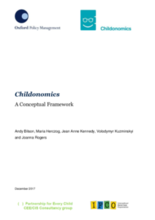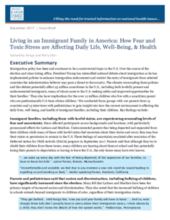Demographic Data
|
Sources: World Bank, UNICEF, UNDP HDR 2015, DHS 2011 |
Displaying 8781 - 8790 of 14391
In this video from Matter of Fact, Correspondent Jessica Gomez meets with lawyers from the Safe Passage Project who say they can help unaccompanied migrant children in the US.
UNICEF is seeking a Child Protection Specialist in Senegal.
The aim of this study has been to assess the reasons for the increased enrolment of children into orphanages and child care centres. An action research was conducted in Islamabad and Rawalpindi between November and December 2017 to assess the situation and identify the causes and circumstance that bring in and compel orphans and vulnerable children to move out after a certain age or grade.
This paper presents the conceptual framework for the Childonomics research project, which has developed the first iteration of a methodology that helps people to reflect on the long-term social and economic return of investing in children and families within a given national or sub-national context.
This resource aims to set standards for quality, compassionate care for GBV survivors in humanitarian settings, with particular focus on the provision of case management services.
This Practice Guidance, developed by SOS Children’s Villages International and CELCIS, seeks to promote improvements in practice that should have a positive impact for young people during and after the leaving care process. The contents of this Practice Guidance are in good part informed by a detailed Scoping exercise that was carried out in each of the five countries participating in this project: Croatia, Italy, Latvia, Lithuania and Spain.
This report presents a joint NGO roadmap for more fair and humane policies for refugee and migrant youth in Greece.
The authors of this study conducted focus groups with 100 parents from 15 countries and 13 interviews with pediatricians to gain insight into how the current political environment in the United States is affecting the daily lives, well-being, and health of immigrant families, including their children.
This report highlights initiatives underway that work towards addressing the care and protection of refugee, migrant and displaced children – initiatives that can be replicated around the world.
This brief article will outline the path to the provision of an explicit entitlement to aftercare in Ireland.







